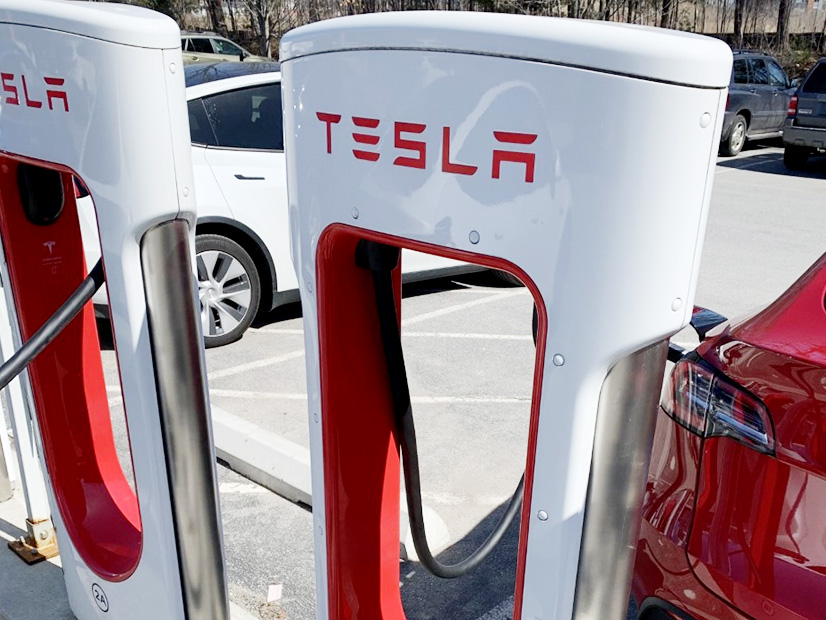
Seven major automakers pledged to install 30,000 DC fast chargers in the U.S., which would more than double the current fast charging infrastructure.
Seven major automakers said Wednesday they will install 30,000 DC fast chargers on U.S. highways and in urban areas — a commitment that would more than double the existing fast charging infrastructure.
The seven ― BMW Group, General Motors, Honda, Hyundai, Kia, Mercedes-Benz Group and Stellantis NV ― are forming a joint venture to create a network of charging stations that will be accessible to EVs from all automakers, regardless of the type of charging plug they use, according to the announcement.
A number of automakers — including GM and Ford — recently announced their intention to switch from the Combined Charging System (CCS) charging plug on most EVs to Tesla’s North American Charging Standard (NACS), setting up a potential conflict for customers and EV charging companies.
The companies forming the joint venture aim to provide a “seamless” experience for all EV drivers, the announcement says. “In line with the sustainability strategies of all seven automakers, the joint venture intends to power the charging network solely by renewable energy,” the announcement said.
“North America is one of the world’s most important car markets — with the potential to be a leader in electromobility. Accessibility to high-speed charging is one of the key enablers to accelerate this transition,” BMW Group CEO Oliver Zipse said in the announcement.
182,000 Chargers Needed
The National Renewable Energy Laboratory says the U.S. had more than 19,000 publicly available DC fast chargers through the first quarter of 2023, 61% of which were Tesla “superchargers.” NREL has estimated that by 2030, the country will need 182,000 fast chargers for the 30-42 million EVs Americans will be driving.
As described in the announcement, the new charging stations will be similar to gas stations, placed “in convenient locations offering canopies wherever possible and [will have] amenities such as restrooms, food service and retail operations either nearby or within the same complex.” The automakers also are planning “a select number of flagship stations … equipped with additional amenities.”
The joint venture officially will be formed later this year, with the first U.S. stations scheduled to open in the summer of 2024, with additional stations in Canada to follow, according to the announcement.
Initial deployments will focus on metropolitan areas, major highways and travel corridors, and vacation routes.
Each station will have multiple DC fast chargers that either meet or exceed the technical standards in the federal government’s National Electric Vehicle Infrastructure (NEVI) program, the announcement said.
Funded with $5 billion from the Infrastructure Investment and Jobs Act, the NEVI program is focused on creating a national network of DC fast chargers on the nation’s highways. The program’s technical standards call for stations to have at least four 150-kW chargers that take any credit card and are in operation 97% of the time.
Automakers also are competing with each other to design EVs with batteries that high-powered DC fast chargers can top up in under 20 minutes.
“The better experience people have, the faster EV adoption will grow,” said GM CEO Mary Barra.
Research from the Department of Energy has found that 80% of EV charging is done using slower Level 2 chargers at home. But the need for a nationwide network of fast chargers is seen as critical for allaying consumers’ concerns about having enough power for longer trips and reaching U.S. emission-reduction goals.
President Joe Biden wants at least 50% of all new cars sold in the U.S. to be plug-in electric vehicles by 2030. A small but growing number of states — eight: Maryland, New Jersey, Maine, Washington, Oregon, Vermont, Massachusetts and New York, according to the Sierra Club — have adopted California’s Advanced Clean Cars II rule, which requires all new cars sold in the state to be zero emission by 2035.
The reaction from the White House was predictably positive. Press secretary Karine Jean-Pierre called the announcement “an important step forward,” and stressed the potential job creation resulting from the joint venture.
Katherine García, director of the Sierra Club’s Clean Transportation for All initiative, said the initiative “is a major win as we accelerate the electric vehicle transition. We welcome the effort and urge the automakers to fulfill this commitment to making the EV charging experience better and faster for drivers across the country.”

